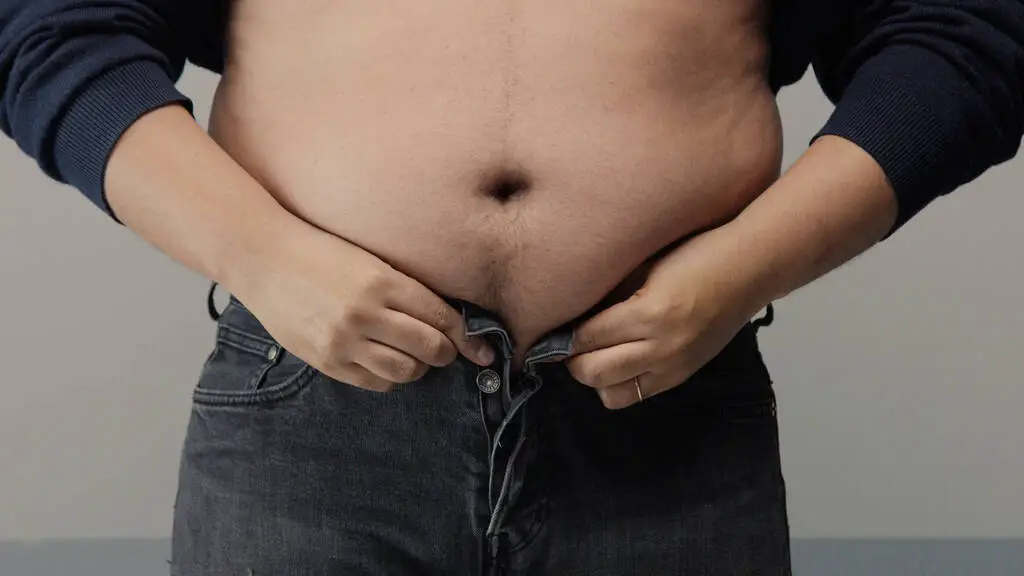
Have you ever felt like you’ve tried everything to lose weight, but nothing seems to work? You’re not alone. In this post, we’ll explore some of the reasons you might struggle to shed pounds and provide some tips for getting back on track. So keep reading if you’re ready to start seeing results!
Table of Contents (click to expand)
Common reasons why you can’t lose weight
Most of us have had trouble losing weight. There could be many reasons why you can’t seem to lose weight, no matter what you do. Perhaps you’re not eating the right foods, or maybe you’re not exercising enough.
It’s also possible that you’re consuming too many calories each day. If you can’t seem to shift the weight no matter what you do, it’s a good idea to see a doctor or nutritionist who can help you figure out what’s going on and how to fix it.
Related: How to Consume White Vinegar for Weight Loss: 20 Simple Ways
1. Medical conditions that can cause weight loss resistance
If you are trying to lose weight and are not succeeding, it is important to consult your doctor to rule out any medical reasons for your difficulty. Some medical conditions can make it difficult or impossible to shift weight, even with diet and exercise. Examples of these conditions include:
-
Underactive thyroid gland (hypothyroidism)
-
Cushing’s syndrome
-
Polycystic ovary syndrome
-
Insulin resistance or diabetes
-
Certain types of cancer
-
Heart failure
2. Not enough exercise
If you’re not getting enough exercise, it could be affecting your weight-loss efforts. Exercise is key to losing weight and keeping off because it helps burn calories and build muscle. When you don’t get enough exercise, your body may start storing extra calories as body fat, making it harder to drop weight.
Try to fit in at least 30 minutes of cardio five times a week and strength training at least twice a week. You can break up the cardio and strength training into smaller sessions if that’s more manageable for you, but make sure you hit both goals each week.
3. Poor diet
A poor diet can affect weight loss in a few ways. One way is that if you’re not eating healthy foods, you may not get the nutrients you need for your body to function properly. This can make it harder for you to lose weight and may also cause you to gain weight. Another way a poor diet can affect weight loss is if you’re eating many unhealthy foods, such as fast food or sugary snacks, you’re likely to gain weight.
If you’re struggling to shift the pounds because of your poor diet, there are a few things you can do to fix it. One thing is to start by making healthier choices regarding the foods you eat. This means choosing whole, unprocessed foods whenever possible.
Another thing is to make sure that you’re getting enough exercise. Exercise can help burn calories and promote healthy weight loss. Finally, it’s important to stay positive and be patient. Losing weight takes time, and it’s not always easy. But with patience and perseverance, you can reach your goals.
Related: How to Eat Flax Seeds for Weight Loss
4. Genetics
Poor genetics can affect your weight loss efforts because some people are naturally predisposed to be heavier or thinner than others. Unfortunately, poor genetics are a barrier to losing weight for some people. This means they must work harder than others to lose weight and keep it off. Despite this, there are still ways that you can overcome your genetics and achieve your weight loss goals.
One way to do this is by increasing the intensity of your workouts. This can help increase your muscle mass to boost your metabolism and burn more calories. Another way is to ensure you eat a healthy diet full of nutritious foods. Eating unhealthy foods will only sabotage your efforts and make it harder for you to lose weight.
Finally, you can also try to get enough sleep each night. Getting enough sleep can help to reduce stress levels and make it easier for you to stick to your diet and exercise plan.
5. Emotional eating
Emotional eating is eating to soothe your emotions rather than satisfy your hunger. This can lead to gaining weight over time, as you may eat more than you should during binge eating sessions. Additionally, if you are eating foods high in calories and unhealthy fats, your chances of losing weight are slim (no pun intended).
Identifying the emotions that trigger your cravings is important to overcome emotional eating and losing weight. Once you know what sets you off, you can develop strategies to deal with those emotions more healthily.
For example, if boredom leads to binge eating for you, try taking a walk or reading a book instead. If stress makes you reach for junk food, try yoga or meditation. By addressing the root cause of your emotional eating, you can start to make progress towards healthy weight loss.
6. Lack of motivation
A lack of motivation can affect weight loss in a few ways. First, if you’re not motivated to stick to your diet or exercise plan, you’re more likely to cheat or skip workouts. This can lead to weight gain over time.
Second, if you’re not motivated to lose weight, you may be less likely to make healthy food choices or stick to a calorie limit. Finally, a lack of motivation can lead to boredom with your diet or workout routine, leading to weight gain.
If you struggle to stay motivated, it can affect your weight loss goals and even lead to you regaining weight. One way to stay motivated is to set realistic goals. Don’t strive for unrealistic goals that are impossible to achieve. Instead, set small goals that you can gradually work towards. This will help keep you motivated and on track.
Another way to stay motivated is to find a support group or buddy system. When you have someone to help keep you accountable, it can be a lot easier to stick to your goals. Plus, it’s always more fun to do things with other people!
Related: What to Eat with Hummus for Weight Loss: 30 Healthy and Delicious Options
Steps you can follow to ensure you can lose weight no matter what

There are a lot of different opinions out there on what the best approach is. Some people say you have to cut out all carbs, while others maintain that dieting isn’t necessary and you can exercise more. So, who’s right?
The truth is, there is no one-size-fits-all solution when it comes to shedding pounds. However, if you follow these simple steps, you can be sure that you’ll be able to lose weight no matter what your circumstances might be. Keep reading for more information!
Eat a balanced diet and avoid processed foods
Processed foods are generally high in sodium, unhealthy fats, and added sugars. Eating a processed diet can lead to weight gain and other health problems like heart disease and diabetes.
A balanced diet is vital for maintaining a healthier weight and preventing chronic diseases. Eating plenty of fruits, vegetables, whole grains, and lean protein is important. Opt for lean protein sources like grilled chicken, fish, tofu, legumes, and eggs. Limit your intake of processed foods and sugary drinks, and enjoy healthy snacks like fruits and nuts instead.
Drink plenty of water and avoid sugary drinks
Water is one of the most important things you can drink when trying to lose weight. It helps to flush out toxins and keeps your body hydrated. When you’re dehydrated, your body will hold on to water weight, making it more difficult to drop the pounds.
Drinking plenty of water also prevents you from eating too many sugary drinks, which can lead to weight gain. So make sure to drink plenty of water daily – it will help you lose weight and stay healthy!
Exercise regularly
Exercise is important for many reasons. It can help you lose weight, which is obviously important if you are trying to slim down.
Exercise also helps you build muscle; the more muscle you have, the more calories you burn. This means that even when you are not exercising, your body still burns calories, which can help you lose weight.
Exercise also has mental benefits; it can help relieve stress and make you feel happier and more relaxed. All of these benefits make exercise an important part of any weight loss plan.
Get enough sleep
When trying to lose weight, it’s important to ensure you get enough sleep. Sleep helps your body recover from the day’s activities, and it also helps to regulate your metabolism.
When you don’t get enough sleep, your body produces more cortisol, which is a hormone that can lead to weight gain. Getting enough sleep is essential for keeping your body healthy and helping you reach your weight loss goals.
Stress less
When it comes to weight loss, one of the most important things you can do is keep your stress levels in check. When you’re stressed, your body produces cortisol, a hormone that encourages your body to store fat. In addition, when you’re stressed, you’re more likely to indulge in unhealthy foods. So if you want to lose weight, it’s important to find ways to reduce your stress levels.
There are plenty of ways to reduce stress, and everyone will find different techniques that work best for them. Some people find that exercise helps them relax, while others find that meditation or yoga helps them calm down.
Others may find that simply spending time with friends or family helps them relax. Whatever works for you, make sure to include it in your routine so that you can keep your stress levels under control and make progress on your weight loss goals.
Related: How to Tighten Skin After Weight Loss Naturally
Avoid eating late at night
There are many reasons why you should avoid eating late at night. One of the most important is that it can lead to weight gain. When you eat late, your body has trouble digesting all of the food, leading to bloating and indigestion.
Additionally, eating a large meal right before bed can interfere with sleep quality and make it harder to fall asleep. Eating late can also cause problems with blood sugar levels, which can harm your overall health. All in all, there are plenty of good reasons to avoid eating late at night – so try to make dinnertime your last meal of the day!
Frequently asked questions
Should I lift weights to lose weight?
There is a lot of debate surrounding the use of weights for weight loss. Some people swear that lifting weights is the key to losing weight and toning up, while others believe it is counterproductive and can even lead to gaining weight. So, what is the truth?
The answer to this question is, unfortunately, not clear-cut. Lifting weights can definitely help you lose weight, but only if it is part of a healthy diet and exercise regime. If you are overeating or not getting enough exercise, adding weights to your routine will not help you achieve your goals. In fact, you might even gain weight.
However, if you are already eating healthy and getting enough exercise, lifting weights can be an excellent way to boost your results. It can help you burn more calories, tone your body and improve your overall fitness.
Just make sure you are using the right weight for your fitness level and taking adequate breaks between sets to allow your body time to recover.
What is the laziest way to lose weight?
The laziest way to eliminate excess fat is by eating healthy and exercising. This may not be the easiest or quickest way to lose weight, but it is the most effective. Healthier eating means consuming nutrient-rich foods that will help you feel full and satisfied, while exercising helps torch calories and promote weight loss.
If you are looking for a quick fix, the lazy way to shed weight is not the right solution for you. However, if you are willing to make a few small changes to your diet and commit to regular exercise, you can see results over time without spending hours in the gym.
Why am I gaining weight when I barely eat?
The first thing to consider when trying to understand why you might be gaining weight when eating so little is that everyone’s body is different. What might work for one person might not work for another. Additionally, many other factors can contribute to weight gain, such as stress or a lack of exercise.
However, one possible explanation for why you’re encountering difficulty losing weight even though you don’t eat much is that your body is holding on to the calories instead of burning them off, leading to excess weight. This could be due to many reasons, such as an inability to metabolize food or a hormonal imbalance properly.
If you’re struggling to lose weight even though you’re eating very little, it might be a good idea to speak to a doctor or nutritionist who can help you figure out what’s going on and how best to address it. In the meantime, making small changes to your diet and lifestyle could help jumpstart your weight loss journey.
How can I boost my metabolism?
Unfortunately, some people do suffer from a slower metabolism. You can do a few things to boost your metabolism and help lose weight. One is to eat breakfast every day. Breakfast helps get your metabolism going and keeps you from snacking later in the day.
Another is to exercise regularly. Exercise not only helps melt calories, but it also helps rev up a slow metabolism. Finally, drink plenty of water. Drinking water helps boost your metabolism and flush toxins from your body.
Can eating too few calories cause weight gain?
Eating too few calories is a possibility when it comes to gaining weight. If your body doesn’t get enough energy from food, it will start to store calories within your fat tissue. This fat storage can increase weight over time, even if you’re not eating many calories.
You can do a few things to ensure you’re not eating too few calories. First, ensure you include plenty of healthy food in your diet. Second, try not to cut out too many calories altogether. Finally, ensure you’re getting enough protein and fibre to help keep you feeling full.
Related: What is Medical Weight Loss?
Wrapping up
If you’re struggling to lose weight, know you’re not alone. Many common reasons people can’t seem to shed those unwanted pounds. However, you can make the appropriate changes to get results by understanding the potential causes of your weight loss resistance.
Be sure to check with your doctor first to rule out any medical conditions that may be at play. Once you have a clean bill of health, take a close look at your diet and exercise habits. If you eat healthily and work out regularly but still not seeing results, genetics or emotional factors could be the culprits.
Don’t give up hope no matter the reason for your weight loss challenges. Stay consistent with your efforts, and the weight will eventually start coming off.





































